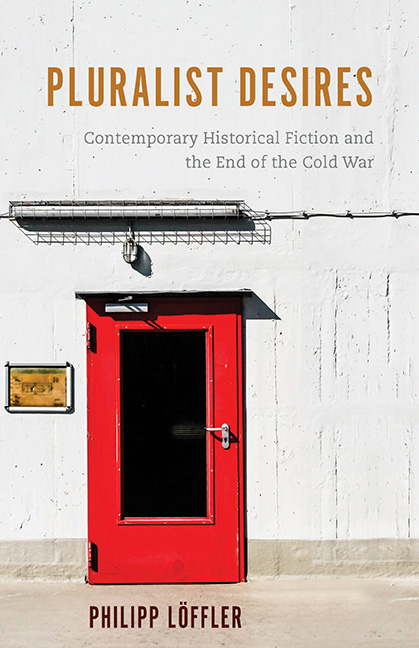Book contents
- Frontmatter
- Contents
- Acknowledgments
- Introduction: Saving Private Ryan, the End of the Cold War, and the Value of Historical Experience
- 1 The Uses of History: From Nineteenth-Century Historicism to Twenty-First-Century Pluralism
- 2 “No Longer and Not Yet”: Don DeLillo and the Aftermath of the Cold War
- 3 After Race: Body Language and Historiography in Toni Morrison's Beloved and A Mercy
- 4 “A Singular Act of Invention”: Storytelling, Pluralism, and Philip Roth's American Trilogy
- 5 Lukácsian Aesthetics, Self-Creation, and Richard Powers's Plowing the Dark
- Epilogue
- Notes
- Bibliography
- Index
2 - “No Longer and Not Yet”: Don DeLillo and the Aftermath of the Cold War
Published online by Cambridge University Press: 05 February 2016
- Frontmatter
- Contents
- Acknowledgments
- Introduction: Saving Private Ryan, the End of the Cold War, and the Value of Historical Experience
- 1 The Uses of History: From Nineteenth-Century Historicism to Twenty-First-Century Pluralism
- 2 “No Longer and Not Yet”: Don DeLillo and the Aftermath of the Cold War
- 3 After Race: Body Language and Historiography in Toni Morrison's Beloved and A Mercy
- 4 “A Singular Act of Invention”: Storytelling, Pluralism, and Philip Roth's American Trilogy
- 5 Lukácsian Aesthetics, Self-Creation, and Richard Powers's Plowing the Dark
- Epilogue
- Notes
- Bibliography
- Index
Summary
Critics like to speak in superlatives when they measure the impact of Don DeLillo on postwar American fiction, but there is considerable disagreement about the precise nature of his greatness. According to John Duvall, DeLillo is “one of the most important American novelists since 1970” because of “his fiction's repeated invitation to think historically.” Duvall's assessment is a viable starting point, because however central Don DeLillo's work really is, it no doubt reflects an almost obsessive interest in the history of the postwar decades. DeLillo's novels all focus—in some way or another—on the question of to what extent the Cold War has shaped American culture in ways that are not documented in official, textbook versions of the twentieth century. The central concern in many of his novels—think of Libra, Mao II, Underworld, or Falling Man—is in fact the possibility of thinking beyond the confines of the ordinary and looking at those figures that often evade the frameworks of historiography proper.
But the point of DeLillo's fiction is not only to envision alternative plots and speculative counter-histories rather than the more traditional accounts of the postwar era. That would be a classical postmodernist agenda, asking what we can or cannot know about history. American history, for DeLillo, is relevant not primarily as a field of epistemological inquiry or skepticism but as a very practical archive of stories that people need to get a grip on their own lives—here and now. This aspect sets his works far apart from more generic versions of postmodernist historiographic metafiction. As readers delve into the worlds of the postwar decades—in books like Libra, Mao II, or Underworld—they also learn about the uses of history that such literary encounters enable: the way we perceive a series of historical events is conditioned by the way we conceptualize them within a coherent narrative.
DeLillo often seems to tell readers that we need such narratives to stabilize our individual lifeworlds. This is why the Cold War period is so integral for him as a cultural reference frame; not because we need additional knowledge about the Cuban missile crisis, the assassination of John F. Kennedy, or Watergate, but because the Cold War period itself was paralleled by the co-evolution of a historical vocabulary that made life in the postwar decades universally meaningful.
- Type
- Chapter
- Information
- Pluralist DesiresContemporary Historical Fiction and the End of the Cold War, pp. 34 - 65Publisher: Boydell & BrewerPrint publication year: 2015

